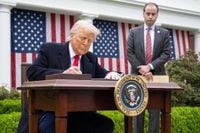Brazil is contemplating a significant response to the U.S. tariffs imposed on its exports, a move that could escalate tensions between the two nations. The recent announcement by U.S. President Donald Trump, which includes a 10 percent surcharge on Brazilian products, has triggered a wave of reactions from Brazilian officials, who are now considering appealing to the World Trade Organization (WTO) to contest these measures.
In a joint statement released on April 2, 2025, the Brazilian Ministries of Foreign Affairs and Development, Industry, Trade, and Services emphasized that their primary objective is to negotiate a reversal of these tariffs. They stated, "The Brazilian government remains open to deepening dialogue established over recent weeks with the US government to reverse the announced measures and mitigate their harmful effects as soon as possible. At the same time, it is evaluating all possible actions to ensure reciprocity in bilateral trade, including appealing to the World Trade Organization to defend legitimate national interests."
The statement from Brazilian officials highlights the belief that Trump's measures violate WTO rules, underscoring the urgent need for Congress to approve the Reciprocity Law, which would allow Brazil to retaliate against countries imposing trade barriers on its products. The 10 percent surcharge is projected to impact all exports to the United States, which is Brazil's second-largest trading partner.
According to U.S. government data, the trade balance has historically favored the United States, with Brazil importing more from the U.S. than it exports. In 2024 alone, the U.S. recorded a $7 billion trade surplus with Brazil in goods, and when services are included, the surplus jumped to $28.6 billion, making it the third-largest trade surplus globally.
Over the past 15 years, the U.S. trade surplus with Brazil has exceeded $400 billion. Brazilian officials argue that Trump's unilateral tariffs do not accurately reflect the actual trade balance, stating, "Since the US has recorded recurring and significant trade surpluses in goods and services with Brazil over the past 15 years, totaling $410 billion, the unilateral imposition of an additional 10 percent linear tariff on Brazil, with the claim of the need to restore balance and 'trade reciprocity' does not reflect reality."
Meanwhile, the economic fallout from Trump's tariffs has been significant, not only for Brazil but also for the U.S. stock markets. On the same day Brazil announced its response, U.S. markets experienced their worst day since March 2020, with the Nasdaq dropping 6%, the S&P 500 falling 4.8%, and the Dow Jones receding 4%. American companies collectively lost $3.1 trillion in market value, with companies reliant on goods produced in Asia suffering the most. For instance, Apple saw its stock plunge by 9%, while Dell and Best Buy faced declines of 19% and 18%, respectively.
The Stoxx 600, a European companies index, also fell by 2.7%, indicating a broader impact of the tariff measures. The dollar, measured by the DXY index, lost 1.6% of its value, marking a total depreciation of 6% for the year. In Brazil, the U.S. dollar's value fell by 1.2%, closing at R$ 5.62, the lowest since October.
According to an analysis by the Budget Lab at Yale University, Trump's new tariff measures will elevate effective tariffs to 22%, the highest level of import taxation since 1909. Goldman Sachs estimates that the final average tariff will be around 15%, a stark increase from the previous average of 2.5% before the announcement.
For countries like Brazil, which have a trade surplus with the U.S., an additional 10% tariff will be applied. The effective average tariff increase is expected to be around 6.5 percentage points, totaling 8% when accounting for existing tariffs. This could translate to a loss of $3,800 in income for American households, with the poorest households facing an average impact of $1,700.
President Lula of Brazil, responding to the tariffs, stated on April 3, 2025, that Brazil respects all countries but demands reciprocity. He emphasized, "In light of the U.S. decision, we will take all necessary measures to defend our companies and our Brazilian workers." Lula's response is guided by the recently passed law enforcing reciprocity in environmental and trade regulations with other countries, as well as by WTO guidelines.
Days prior to the tariffs being announced, Lula had expressed willingness to negotiate with President Trump to prevent the imposition of tariffs. However, the new measures include a 25% tariff on all automobiles manufactured outside the U.S., along with increased duties on Brazilian steel and aluminum exports, which will also rise to 25% starting March 12, 2025.
The situation remains fluid as both countries navigate the complexities of international trade relations. The Brazilian government is keen on collaborating with companies in the affected sectors to defend national trade interests. As the dialogue continues, the potential for retaliation looms, raising concerns about a trade war that could have far-reaching implications for both economies.
As the world watches, the unfolding events underscore the delicate balance of global trade and the need for cooperative dialogue to prevent further economic fallout. With both nations standing firm in their positions, the outcome of this trade dispute will likely shape international trade policies in the years to come.



